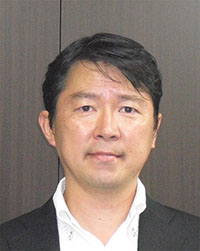

Seiichiro Ten-no

Born January 25, 1965 in Hiroshima, Japan.
Professor, Graduate School of Science, Technology, and Innovation, Kobe University, Kobe, 657-8501 Japan.
Email:tenno@garnet.kobe-u.ac.jp
WWW: external link
D.Sc. (1994) Kyoto University. Research Fellow Abroad of the Ministry of Education, Czech Academy of Science (J. Heyrovsky Institute, Prague) (1997). Morino Foundation for Molecular Science Prize (2004). Pople Medal of the Asian Pacific Association of Theoretical and Computational Chemists (2007). Distinguished Scientist Awards of the Japan Society for Molecular Science (2010). Member of the International Academy of Quantum Molecular Science (2012). Elected board member of World Association of Theoretical and Computational Chemists (2014).
Important Contributions:
- Explicitly correlated F12 electronic structure theory: Introduction of the Slater-type (exponential) geminal correlation factor; New methods for many-electron integrals using the density fitting and molecular numerical integration techniques; Explicitly correlated methods utilizing the first order cusp conditions for geminal amplitudes (diagonal orbital-invariant SP or FIXED amplitudes Ansatz); Innovation of the rational generator approach for open-shell molecules granting the spin-flipped and internally contracted geminal basis concepts in open-shell and multi-reference F12 electronic structure methods; Four-component relativistic F12 approach.
- Miscellaneous developments in electronic structure theory: Density fitting utilizing one-center products of orbital basis functions as auxiliary functions; Range-separated density functional theory using the Yukawa potential with Gaussian-type basis functions; Model space quantum Monte Carlo method for the full CI solution of arbitrary excited states with quasi-degeneracy.
- Theory of solvation: Introduction of a coupled solvation model of the RISM integral equation theory and ab initio electronic structure theory (RISM-SCF method; with F. Hirata and S. Kato); Formulation of a novel integral equation method for molecular liquids based on the distributed partial wave (PW) expansion of the molecular Ornstein-Zernike equation using multi-center rotational invariants.